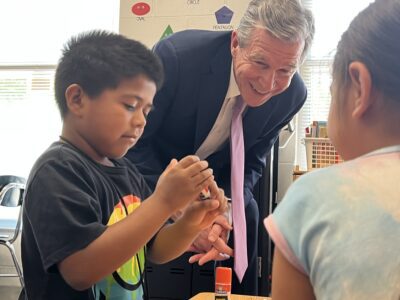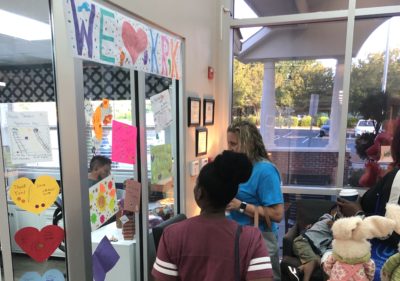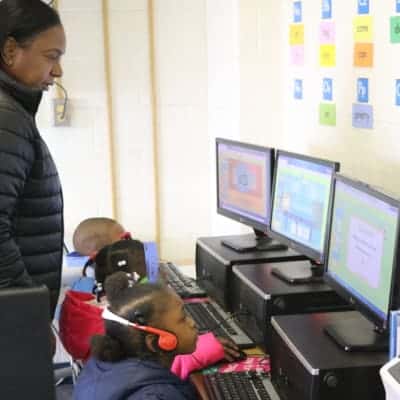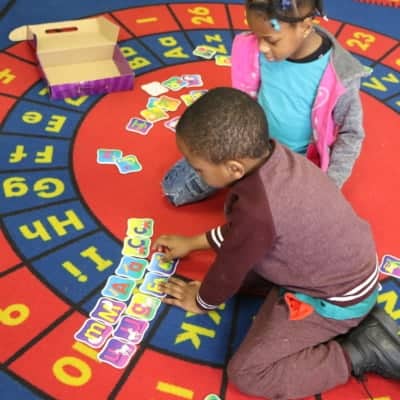In Benjamin Eustice’s first three weeks at Scotland Neck Elementary School in Halifax last spring, he estimated he was involved in suspending five to 10 students. This entire school year, he has only suspended one student.
This is part of Eustice’s challenge as a first-year principal: creating an atmosphere where students are held accountable for their actions and are ready to learn. He has worked with staff to offer a different perspective on discipline. Instead of jumping to the most serious form of punishment, Eustice said he has started to implement pieces of restorative justice in small ways. That shift in culture is starting to take hold in students’ mindsets, he said.
“You don’t have kids who are fearful to do something wrong,” Eustice said. “They’re more quick to accept that they’ve done something wrong and to own it, whereas I think in the past, at least from what I’ve heard, it’s been a more, ‘If you do something wrong, you’re fearful because as soon as you own up, you’re in trouble for it, or you’re in deeper trouble for it.'”
If two children have a fight, Eustice said his discipline approach is not about making students feel bad or miss class time but creating opportunities for rectifying the situation.
“Now I think they are learning that restorative practice that I try to use where, you’re doing something to make it right, or you’re doing something where you’re trying to gain your classmate’s respect back, or your teacher’s respect back, or my respect back as your administrator.”

The school, a 225-student pre-K-to-fifth grade elementary school, still has its challenges. Scotland Neck received a D in the state’s A-F grading system last year. Eighty percent of that score is based on test results and 20 percent is based on year-to-year student growth. Math scores are particularly low, Eustice said. Low performance grades are strongly correlated with high levels of poverty, which is a reason why some education advocates do not feel the grades reflect the quality of education students are receiving.
The school is located in Halifax County, which is not exempt from many of the issues rural counties statewide are experiencing, including high poverty and little to no industry. The county had a 5.3 percent unemployment rate without seasonal adjustment in October 2018 compared to the state’s 3.4 percent. Compared to North Carolina’s median income from 2012 to 2016 of $48,256, Halifax County’s was $32,549.
When it comes to character education and behavior management, dealing with specific incidents is only one part of the picture. Eustice has been working with teachers to implement action-based learning. There is new furniture like bouncy balls and bikes to keep students, especially the youngest, engaged in learning. Research shows students’ cognitive ability improves when they are physically active. Kindergarten teacher Carolyn Myrick said she is constantly monitoring students’ engagement and pausing instruction for some movement.
“Any time if I notice a child is kind of hyper, or needs to move around, we put them on the bike or on the bouncer,” Myrick said. “Several times during the day, like if we’re leaving our centers, and before they are seated back on the floor for whole group, we do some type of little activity where they can move around. … It’s something as simple as saying your ABCs … or counting to 30, we do that all the time.”
Next in the culture shift Eustice wants to make is tackling bus behavior, “typically the biggest piece of a school’s behavior that is the hardest to control,” he said. He is excited about a district-level initiative to give bus drivers incentives and is working with teachers to encourage bus behavior lessons.
Eustice is aware that external factors influence students’ abilities to succeed in school and beyond. Another of his goals this year has been reaching out and strengthening relationships with parents and community partners. In his first school year, attendance in PTA events has increased dramatically. He said over 50 parents are attending regularly, compared to about five that showed up to the first event of the year.
Eustice has partnered with Food Lion to take students on field trips to learn about food, nutrition, and business. The company also provides pre-made boxes of food for PTA nights, which helps families not have to stress about dinner for a night. Three Food Lion employees volunteered to help judge the school’s first science fair in 10 years, along with local sheriffs and parents. Almost every third, fourth, and fifth grader had projects in the fair. A student who built a cell phone charger with a battery won first place. He is planning a math curriculum night at Food Lion, an event the chain holds across the Southeast where the grocery store has different activities and lessons around math, the food pyramid, and nutrition.
Eustice said he worries about a lack of activities appropriate for children outside of school and the lack of industry in the region. Food Lion is one of the only large employers in the area.
“In this town, there’s probably less than two dozen businesses,” Eustice said. “And most of the businesses are a couple-people workforce. There’s no major industry here. You have these places to employ people but there’s nothing huge, there’s nothing big-time here. There’s a John Deere dealership, which is pretty world-known. You have the Food Lion. Other than that, it’s gas stations.”
For Myrick, who grew up in Halifax and returned to teach in her home county six years ago, she often wonders what the future of the region is. She said she hopes her son, a high school student in the area, branches out elsewhere after graduation.
“I think we just need a lot more activities here, like community activities,” Myrick said. “We do have some things going on, but I’m thinking a lot more, involving the children more in sports and a lot of things to keep them busy and to keep them off the street. Right now, I’m not seeing that. In the future, I’m not really seeing it. It could happen, it could get better.”
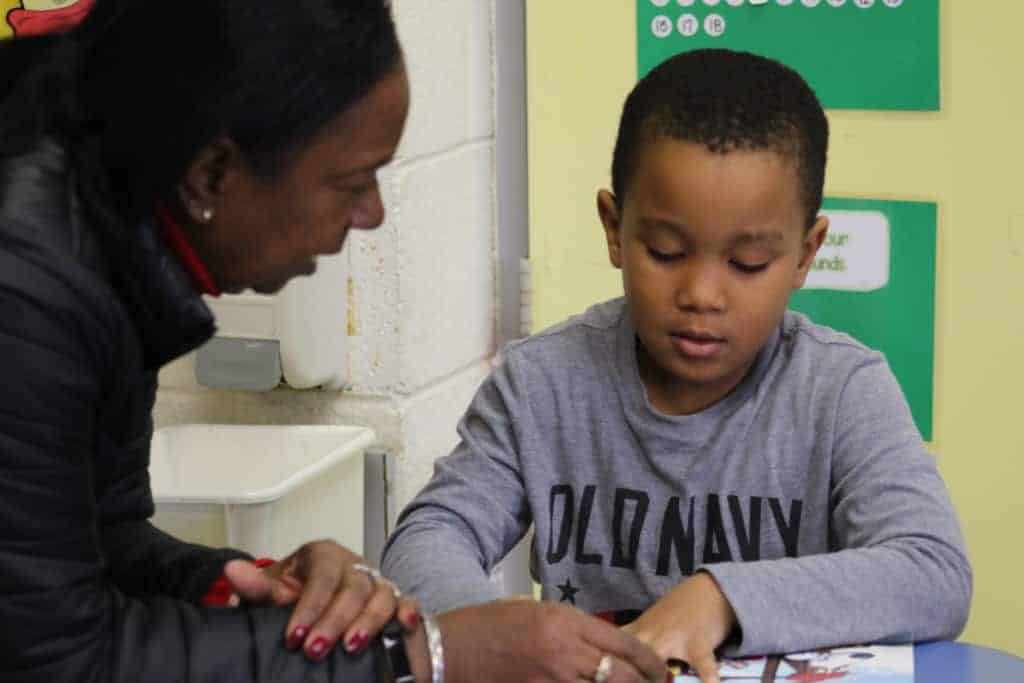
Myrick’s kindergarten class, she said, is doing well at the mid-year point and most of her students are at a reading level C in m-Class, the literacy assessment tool schools throughout the state use to monitor students’ progress. The program is associated with Read to Achieve, a state initiative to improve third-grade reading proficiency.
There are two kindergarten classes at Scotland Neck, one taught by Myrick, who has been teaching for over 29 years. The other kindergarten teacher is Brittney Ruffin, who, after working as an early childhood educator, started teaching at Scotland Neck in December and is studying to get her elementary license. This process is called lateral entry, where individuals without an appropriate teacher’s license can work towards their license while teaching in the classroom and taking courses.
Both teachers have help from teacher assistants. For Ruffin’s kindergartners, teacher assistant Lashunda Perry has been a critical constant in the classroom during a school year with lots of changes. There was a substitute teacher in the classroom for about two months after the previous kindergarten teacher left the school in the fall.
“Is that going to hurt in the long run?” Eustice asked. “I’m sure. Unfortunately, it is not the easiest to go pluck a teacher out and put them in the classroom.”
But the experience has proven positive for Perry, who now has plans to become a full-time teacher. Perry was a bus driver in Nash County and, after volunteering at a summer program about three years ago, knew she wanted to work directly with children. She started subbing at an elementary school and came to Scotland Neck as a teacher assistant last year.
With so much inconsistency with the main classroom teacher, Perry took things into her own hands. She asked the data manager in the front office to print out students’ information and would take the information home at night. She sorted through individual students’ data and saw where they needed extra support, from alphabet to letter recognition. She said there were three children who entered her kindergarten class without preschool experience, which makes a big difference in where they are in basics like letter recognition, name spelling, working with others, and classroom behavior.
“At first, it was a struggle. [Some of] the kids were coming from being at home or straight in from daycare. So it was kind of like where am I supposed to go with them?” Perry said.
When there was only a substitute teacher, Perry said she was not clear on where the main teacher left off. She would often go to Myrick’s room and ask what to do. In the couple weeks Ruffin has been at the school, they both said they have enjoyed getting to know each other and feel they work well as a team. Perry said many students have moved from red to green, meaning from below-grade level to on-grade level, which she counts as a huge success.
“Right now, out of those three that I’ve worked with from day one, you have two that can count to 100,” Perry said with a smile. “So, to me, that’s success. That’s what you want for the parents as well.”
For more articles in our “Early Learning in the East” series, go here.
Recommended reading

